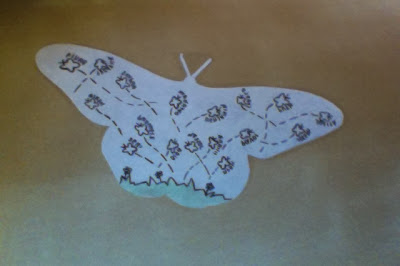In the last week before winter break, my class fought the
Battle of the Bulge, morally justified or condemned dropping the A-bomb,
criticized/idolized Eisenhower, and then learned about the Holocaust. Only three
students, in response to my warm-up question of “Why is it necessary to
remember the Holocaust?”, asked, “What’s the Holocaust?”
 We started out building on their prior knowledge about
propaganda with looks at Nazi anti-semitic posters. We talked a lot, in that
intro, about why anti-semitism exists, and what Jews believe, and whether Jews
are white or what (a “white power” sign with a swastika had them confused—are
you white, Ms. W? Erm, not really sure, kids. To you I am, but let’s find your
rural Southern peers and ask them what they think). All questions to which I
have no very satisfactory answers. Then we began drawing the obvious parallels
between the Nuremberg Laws and segregation.
We started out building on their prior knowledge about
propaganda with looks at Nazi anti-semitic posters. We talked a lot, in that
intro, about why anti-semitism exists, and what Jews believe, and whether Jews
are white or what (a “white power” sign with a swastika had them confused—are
you white, Ms. W? Erm, not really sure, kids. To you I am, but let’s find your
rural Southern peers and ask them what they think). All questions to which I
have no very satisfactory answers. Then we began drawing the obvious parallels
between the Nuremberg Laws and segregation.
Next slide: Ghetto: segregated Jewish neighborhood.
Ghetto!
I don’t like that
word.
Yo, I’m G!
So, when we say
someone’s “G,” we’re calling them a Jewish neighborhood?!
 I was stymied. First I threw out the kid who responded to
the girl who doesn’t like “ghetto” by asking, “why, does it remind you of
home?” Then I started saying something about the sociological implications of
transferring the word “ghetto” from Europe where it was applied to the most
loathed dregs, the Jewish scapegoats of European bigotry, and slapping it on
the dilapidated neighborhoods that minorities in America are relegated to. I
stopped—I couldn’t pass it through the academic jargon into their language, nor
think of a way to say it that would provide any meaningful next step.
I was stymied. First I threw out the kid who responded to
the girl who doesn’t like “ghetto” by asking, “why, does it remind you of
home?” Then I started saying something about the sociological implications of
transferring the word “ghetto” from Europe where it was applied to the most
loathed dregs, the Jewish scapegoats of European bigotry, and slapping it on
the dilapidated neighborhoods that minorities in America are relegated to. I
stopped—I couldn’t pass it through the academic jargon into their language, nor
think of a way to say it that would provide any meaningful next step. |
| The kid who did her Holocaust memorial butterfly in Christmas colors-- hehe |
 |
| Beautiful: children from the Holocaust's names above butterflies |
In front of me, I had kids grappling with the Holocaust. I had
to check in and help them make some kind of sense of it. I used the Butterfly
Project from the USHMM to give them a chance to do something positive. Each
student received a poem written by a child at Thereisenstadt and began creating
a butterfly to memorialize the child. At the front of the room, I’d printed off
ID cards from the USHMM site and every so often a student wandered over to read
them and incorporate their lives into their project.
Two of my students, insightful kids who sit in the back,
called me over while they were working on their butterflies.
“Um, Ms. W, we’re just wondering… is it uncomfortable for
you to talk about this?”
“Yes.” I thought about what to add to that answer. “It is,
but I think maybe that’s why it’s important to talk about… exactly because it
matters to me, because it’s my
history. I mean, how many other Jews do you guys know?” They squirmed a bit in
their chairs, and shook their heads. “That’s right. I’m it. So I have a
responsibility to share. I think it’s important for people to share the things
that are closest to them, to let everyone else see the real picture right from
the source, and that makes my discomfort worth it.”
 |
| Somebody's seen The Boy in the striped Pajamas |
The last day, students learned about genocide in Rwanda. It
was a fairly good lesson, with a reading differentiated on three lexile levels
(that means I re-typed and bowdlerized and added parentheses with explanations
and pictures for two different reading ranges), and then students required to
take the role of UN inspectors writing up “special reports” on the Hutu and
Tutsi genocide and make their recommendations to the UN. They connected the
racist German influence on Rwanda to the Holocaust and discussed global
responsibility towards human rights violations. A good ending to the week. Perhaps,
just perhaps, I’m guiding them towards responsible, sympathetic approaches to
the rest of humanity. The Roman aqueducts and Magna Carta be damned. Right now,
I’m just worrying about cultivating humanity, dignity, and respect in my fellow
human beings, even when none is being shown to them.

No comments:
Post a Comment